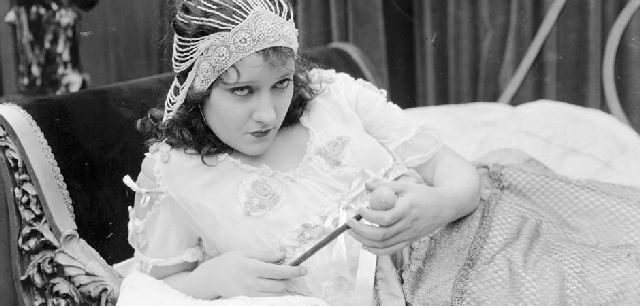Male and Female (1919) 

Director: Cecil B. DeMille
Cast: Thomas Meighan, Theodore Roberts, Raymond Hatton
Synopsis: Lady Mary Lasenby is a spoiled maiden who always gets her way until shipwrecked with her butler, then learns which qualities are really admirable in a person.
At the tender age of just twenty-years-old, movie legend Gloria Swanson finally found lasting fame while four years into a career that spanned seven decades, but which was only ever really successful in the 1920s. Swanson was very much a star of her age – the roaring twenties and silent cinema – and yet her performance here displays a sophistication that belies her years and which should have assured a successful career at the peak of her profession which, unaccountably, never really happened following the advent of talking pictures.
Swanson plays Lady Mary Lasenby, the rich, spoiled daughter of a British aristocrat. The Lasenby family is served by Crichton (Thomas Meighan), a faithful servant who harbours a secret crush on Mary. However, Mary considers him to be beneath her station and treats him with disdain. The situation changes, however, when the family’s yacht capsizes while on a South Seas cruise, and they – and their servants – find themselves marooned on a desert island.
Within hours of their pitching up on the shores of the deserted island, it becomes clear that the snobbish aristocrats haven’t a clue about how to fend for themselves, while Crichton is in his element. When the family members refuse to carry out simple chores, he leaves them to fend for themselves, but it only takes the smell of Crichton’s home-made soup on their first night on the island to persuade the family that they need their man-servant if they have any hope of survival. Last to yield, of course, is the proud and haughty Lady Mary.
Two years later, society’s rules have been well and truly usurped, and roles have been reversed, with Crichton now the leader of the group, and Lady Mary battling with Tweeny (Lila Lee), the scullery maid who loves Crichton, for the privilege of serving him his dinner. Although the family members are no longer the masters, they are happier than they ever were during their lives of privilege, so will they be tempted to return to their old life when rescue arrives?
Male and Female is based on J. M. Barrie’s stage play The Admirable Crichton, and was later filmed under that title in the 1950s with British actor Kenneth More in the title role. By then it was something of a period piece, but in 1919 wealthy households with a staff of live-in servants weren’t uncommon in Britain. The class structure was certainly a near inviolable aspect of contemporaneous life: lines were drawn at birth and were strictly adhered to, and any breach of the divide would often result in the offenders being ostracised by both sets of peers. Barrie’s play clearly intended to expose the injustice of a system that placed the rights and privileges of the wealthy undeserving above those of the hard-working under-classes. Money wasn’t the measure of a man, and only a deeply flawed social structure allowed such an injustice to flourish.
Whether Cecil B. DeMille was the right man to film such a tale is debatable. He had a reputation of filming ‘daring’ tales about adult relationships at the time that Male and Female was produced, and this movie’s title reflects that reputation rather than the subject of its plot. Of course, DeMille would later earn a reputation as a flamboyant showman with a penchant for flashy Biblical spectacles, and even here that tendency is apparent. References are repeatedly made to Babylonian Kings and Christian slaves, and there’s even a short dream sequence in which, in the movie’s most famous sequence, the plot is pretty much re-told in exotic dress. It’s an unnecessary diversion that adds to an already long running time (for the era), although, to be fair, this is the only sequence which drags badly.
Swanson is a revelation, her luminescent eyes and youthful beauty shining through in every scene, and she gives by far the best performance of the movie. Meighan gives an equally polished performance as the manservant who is prepared to take benign advantage of his new found powers without ever completely losing sight of his and Lady Mary’s relative social positions in the real world. The island, with its plentiful food supply and sophisticated jungle house, is really just a fragile Utopia that, like a dream, will evaporate the moment it’s disturbed by the outside world. Meighan is one of Hollywood’s forgotten leading men; a major star in the silent era, his career declined swiftly with the advent of sound, and he was forced to retire upon discovering he had cancer in 1934.
After a slow first half-hour, in which too much time is spent introducing a large number of characters and establishing their relationships to one another, the pace picks up considerably. Although a couple of tacked-on final scenes that really don‘t convince for a second, and are clearly included purely to cater for Hollywood‘s insistence that all movies had to have a happy ending, diminish what should have been a downbeat finale were the story to retain its realism.
(Reviewed 1st August 2012)
httpv://www.youtube.com/watch?v=3HynrUM92D4
